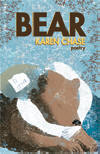Bear
Karen Chase’s second collection of poetry is not only about the significance of bears in terms of humanity’s barbaric need to destroy them through poaching, it is also a metaphorical and allegorical device that permits the author to impart tremendously beautiful narratives, often centered on the most painful and burdensome subjects in her own life. Her poems are emotional songs that dig their claws into your flesh until you simply respond or comprehend what is at stake. These poems of remembrance bridge the gap between the world of the beast, the bear, and the not-so-dissimilar world of human beings often overcome with the same primal tendencies.
Karen Chase’s second collection of poetry is not only about the significance of bears in terms of humanity’s barbaric need to destroy them through poaching, it is also a metaphorical and allegorical device that permits the author to impart tremendously beautiful narratives, often centered on the most painful and burdensome subjects in her own life. Her poems are emotional songs that dig their claws into your flesh until you simply respond or comprehend what is at stake. These poems of remembrance bridge the gap between the world of the beast, the bear, and the not-so-dissimilar world of human beings often overcome with the same primal tendencies.
With the poem, “Bear Safety,” in part two “Bear, I need you,” a human being is taught how to act towards and speak to the bear:
Do my English words
worry you? Can you feel
my breath, Bear? who’s in charge?
Sometimes you go too far.
I am thirsty
for your burgundy meat.
What do you think?
You’d eat me, Bear, and I,
I would eat you. And you?
What do you want?
This poem makes a serious argument about man versus nature in a playful way – if a man stared a bear in the eye on its own turf, would he even have a chance? The absurdity of this poem and many others in this collection is infectious in its theoretical and questioning tone.
With the section entitled “Inside the Lockup,” the subject of death is tackled from the perspective of a salamander as well as, of course, a human perspective colored by experiences in jail:
fear departs as we all do, which gets me to this: why
exactly do we make such a deal of causing another’s death?
Be it the one-time murderer in the next cell, Or even
those who kill and kill, Death, anyway, comes on
us all, no matter what.
Here, the “sanctity of life” question comes into play, questioning the validity of our emotional response to another’s death and the inherent dangers that lie within. The imprisoned narrator in this piece often is found talking to a “Bear,” as if the bear were a mere metaphorical or symbolic construct that has taken away the characters’ power of speech.
In the third section of this daring collection simply called “The Grid,” the “Bear” theme, although not entirely without representation, is put aside to describe the protagonist of these miniature narratives, their hardships, adventures and experiences from childhood through adulthood, such as the “End of their First Marriage,” and the title poem of this section, “The Grid,” which appears to discuss the disastrous affects humanity has had on nature: “The mind blows the trees down, knocks over manmade structures. \ Crows caw through the yellowlit sky, \ every birch rises blue and skyward – a lash of red ribbons – flags slice the skyline, \ eagles screech towards a light.” In this passage, and if you read further, it suggests the havoc that humanity has wrought over its environment and the irrevocable consequences of these careless and often greed driven actions.
In the final section, “The Angel of Used Things,” Chase transports the reader often far away from bears, into a world of daydreams and relatives and loved ones who have passed away. This section’s title poem, “The Angel of Used Things,” recounts objects that one collects on voyages that span the world and their singular associations:
From Krakow to Tesuque, I move
through land and sea, sleep
by the Seine newspapers
inside my black wool devotionals.
I drift in and out of each shabby
Parisian, busy with their wares –
colanders clogs or brass
barrettes – my mouth goes dry.
When I found an arm in an
attic, I was not surprised.
When the unexpected happens in this collection, you are not exactly caught unawares. You laugh at the truths that come out whether it is through satirical and one-sided conversations with overpowering and ravenous bears or through ironic commentaries on the true nature of humanity and all its imaginative and destructive powers. There is an urgency and seriousness to these poems that will scrape at your insides until there is nothing left as you too, like the narrator, scavenge for what is left of your memories, if you can bear it.





